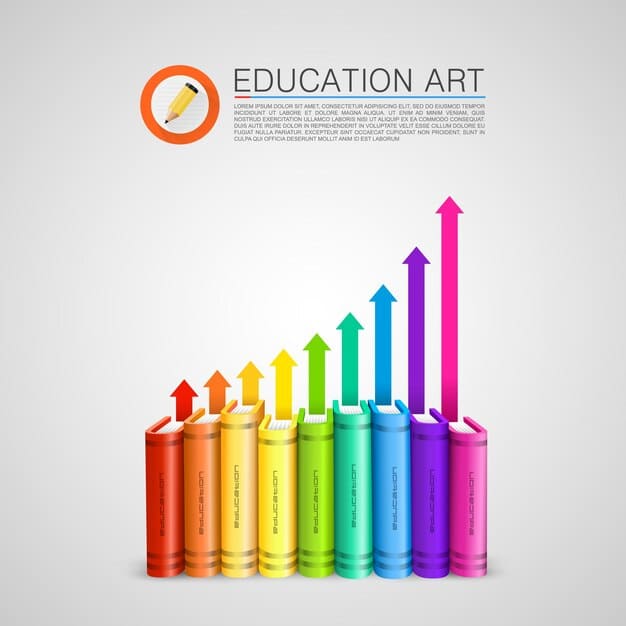Investing in Education: Calculating Your College Degree ROI

Investing in your education involves calculating the return on investment (ROI) of a college degree by considering tuition costs, potential earnings, and career opportunities to determine the long-term financial benefits.
Is a college degree a worthy investment? Explore how calculating the ROI of investing in your education can help you make informed decisions about your future.
Understanding the Basics of ROI in Education
When considering whether to pursue higher education, it’s crucial to understand the basic principles of Return on Investment (ROI). This involves assessing the potential financial benefits against the costs incurred.
ROI in education isn’t just about immediate financial gains. It encompasses long-term career prospects, enhanced skills, and personal development.
Defining Return on Investment (ROI):
ROI is a performance measure used to evaluate the efficiency of an investment or compare the efficiency of a number of different investments. In the context of education, it helps determine whether the financial investment in a college degree is worthwhile by comparing the expected returns (increased earnings and career opportunities) to the costs (tuition, fees, and living expenses).

Why ROI Matters for Students and Families:
For students and their families, understanding ROI is essential for making informed decisions. It helps to weigh the costs of college against the potential benefits, considering factors such as career goals, financial resources, and the overall economic landscape.
- Financial Planning: ROI provides a framework for effective financial planning.
- Career Decisions: It informs decisions about which degrees and career paths to pursue.
- Value Assessment: ROI helps in assessing the true value of a college education.
Calculating ROI helps students and families make sound financial decisions, ensuring that the investment in education yields the desired returns in the long run.
Calculating the Costs of a College Degree
A thorough assessment of the costs associated with a college degree is essential for an accurate ROI calculation. These costs extend beyond just tuition and include various direct and indirect expenses.
Understanding these costs can help you make informed decisions about financing your education and managing your budget effectively.
Tuition and Fees:
Tuition is the primary cost of attending college. It varies widely depending on the type of institution (public or private) and location. Fees cover additional expenses such as registration, technology, and student activities.
Living Expenses:
Living expenses include housing, food, transportation, and personal expenses. These costs can significantly impact the overall investment, especially for students living away from home.
- Room and Board: Cost of on-campus or off-campus housing and meal plans.
- Transportation: Expenses for commuting to campus or traveling home.
- Personal Expenses: Costs for books, supplies, and personal needs.
Opportunity Cost:
Opportunity cost refers to the income a student forgoes while attending college instead of working full-time. This is a significant factor to consider when evaluating the financial implications of pursuing a degree.
By understanding these various costs, students and families can develop a realistic budget and make informed decisions about financing their education.
Estimating the Financial Benefits of a College Degree
Estimating the financial benefits of a college degree involves projecting potential future earnings and career advancement opportunities. These benefits are key components in calculating the ROI of your education.
Factors such as chosen major, industry demand, and geographic location can significantly impact these financial benefits.

Average Earnings by Degree Type:
Different degree types (e.g., associate’s, bachelor’s, master’s) correlate with varying average earnings. Researching these averages can provide a baseline for estimating your potential income.
For example, a bachelor’s degree typically leads to higher average earnings compared to an associate’s degree. Specialized degrees in fields like engineering or computer science often command even higher salaries.
Career Opportunities and Advancement:
A college degree can open doors to a wider range of career opportunities and increase the likelihood of career advancement. Higher education often equips individuals with skills and knowledge valued by employers.
- Job Availability: Degrees in high-demand fields can improve job prospects.
- Promotion Potential: Advanced degrees may lead to faster career advancement.
- Networking: College provides opportunities to build professional networks.
By considering these factors, you can create a comprehensive estimate of the financial benefits associated with your college degree.
Using ROI to Compare Different Educational Paths
ROI can be a valuable tool for comparing different educational paths, such as various degree programs or institutions. This comparison can help you make strategic decisions aligned with your career goals and financial situation.
By evaluating the ROI of different options, you can optimize your educational investment and maximize your potential returns.
Comparing Degree Programs:
Analyze the ROI of different degree programs based on factors like tuition costs, career opportunities, and potential earnings. Some programs may offer a higher ROI due to higher demand or specialized skills.
Evaluating Different Institutions:
Compare the ROI of attending different colleges or universities. Consider factors such as tuition rates, financial aid options, and the institution’s reputation for producing successful graduates.
- Public vs. Private: Public institutions often have lower tuition rates, but private institutions may offer more financial aid.
- Location: Costs of living and job opportunities vary by location.
- Reputation: A prestigious institution may enhance career prospects.
By conducting a thorough ROI comparison, you can identify the educational path that best aligns with your financial and career aspirations.
Financial Aid and Scholarships: Maximizing Your ROI
Financial aid and scholarships play a crucial role in reducing the upfront costs of a college education, thereby increasing the potential ROI. Exploring these options can significantly alleviate the financial burden.
Understanding the various forms of financial aid and how to apply for them is essential for maximizing the value of your educational investment.
Types of Financial Aid:
Financial aid comes in various forms, including grants, loans, work-study programs, and scholarships. Each type has its own terms and conditions, which should be carefully evaluated.
Grants and scholarships are typically need-based or merit-based and do not require repayment. Loans, on the other hand, must be repaid with interest.
Strategies for Securing Financial Aid:
To maximize your chances of receiving financial aid, consider these strategies:
- Apply Early: Submit your financial aid applications as early as possible.
- Complete the FAFSA: Fill out the Free Application for Federal Student Aid (FAFSA) accurately and on time.
- Research Scholarships: Look for scholarships from various sources, including colleges, organizations, and private donors.
By actively pursuing financial aid and scholarships, you can minimize your debt and enhance the ROI of your college education.
Long-Term Career and Financial Planning
Considering long-term career and financial planning is vital when evaluating the ROI of a college degree. Education is an investment that should align with your broader life goals.
Thinking beyond immediate financial gains and considering the long-term impact of your education can lead to more fulfilling and successful outcomes.
Setting Career Goals:
Identify clear career goals and assess how a college degree can help you achieve them. Consider factors such as job satisfaction, work-life balance, and opportunities for professional growth.
Financial Planning Strategies:
Develop a financial plan that incorporates your educational investment and future earnings. Consider factors such as student loan repayment, budgeting, and long-term savings.
- Budgeting: Create a budget to manage expenses and save for future goals.
- Investing: Explore investment options to grow your wealth over time.
- Retirement Planning: Start planning for retirement early to ensure financial security.
By integrating your educational investment into a comprehensive career and financial plan, you can maximize the long-term benefits of your college degree.
| Key Point | Brief Description |
|---|---|
| 💰 Costs Assessment | Evaluate tuition, fees, living expenses, and opportunity costs. |
| 📈 Estimate Benefits | Project potential earnings based on degree, industry, and location. |
| Scholarships | Explore grants and scholarships to reduce upfront costs. |
| Career Goals | Align education investment with financial/career plans. |
Frequently Asked Questions
▼
ROI in education is a metric that calculates the financial benefits of a college degree against its costs. This calculation helps in determining the overall value of investing in higher education.
▼
Calculate the cost by summing expenses like tuition, fees, and living costs. Also, consider the opportunity cost, which is the income you would have earned if you weren’t in school.
▼
Yes, financial aid significantly increases ROI by reducing the amount you need to pay out-of-pocket. Lowering your expenses will yield a greater return over time.
▼
Earnings vary depending on the degree type. Typically, bachelor’s and master’s degrees lead to higher average earnings compared to associate’s degrees and vocational training certificates.
▼
Yes, ROI can assist in comparing different degree programs. By evaluating the ROI you can identify the best educational path that suits your financial goals.
Conclusion
Calculating the ROI of investing in your education can provide valuable insights into the financial and career benefits of a college degree. By understanding the costs, estimating the potential returns, and exploring financial aid options, you can make informed decisions that align with your long-term goals.





